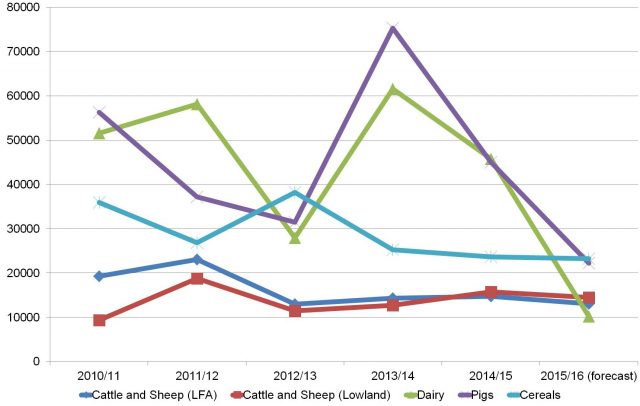
Farm incomes over the last five years in Northern Ireland have shown considerable volatility and this presents challenges for the long- term sustainability of the industry, both within and beyond the new Assembly mandate.
The dairy and pig sectors in particular have experienced considerable income variability. A number of factors have contributed to this, including the costs of inputs, currency differentials between sterling and the euro, the ending of milk quotas and the Russian import ban to name but a few. The impact on farm businesses has been significant.
Whilst the cattle and sheep sectors have not experienced the same extreme rises and falls in income, the fact remains that the incomes for both of these sectors are relatively low and this raises questions around the viability of these businesses. Will it be possible in the future to generate a family income on the basis of cattle and sheep farming alone?
The reliance on EU Direct Payments
An additional feature of agricultural incomes within Northern Ireland is how reliant they are on direct payments under the auspices of the EU’s Common Agricultural Policy. Department of Agriculture and Rural Development (DARD) data from 2013-14 reveals that when measured across all farm types, the average Farm Business Income, with EU direct payments removed, equated to £3,780 per farm. Cattle and sheep farms are particularly reliant on EU direct payments, with Less Favoured Area (LFA) farms from these sectors recording a negative Farm Business Income of -£15,763 in 2013-14 when direct payments are removed.
Challenging growth targets
Within the context of the Northern Ireland Executive’s Going for Growth agri-food strategy, highly volatile and perpetually low incomes present a challenge. Going for Growth contains a number of key targets for the development and growth of the agri-food sector up to 2020 including:
- 60% growth in turnover to £7 billion;
- 15% growth in employment to 115,000 jobs;
- 75% growth in exports (outside NI) to £4.5 billion; and
- 60% growth in total added value to £1 billion.
The achievement of these targets is heavily, and some stakeholders would even suggest solely, reliant upon the maintenance and potential expansion of the farming industry. However, the incomes being derived by many sectors must raise questions around how likely some farmers are to remain within the industry going forward. In effect, and ideally, farmers from all sectors will really need to be profitable on an ongoing basis if they are to contribute to the achievement of the sustainable growth for the entire agri-food sector envisioned within Going for Growth.
Mechanisms to secure profitability
Ensuring the profitability of all farmers in Northern Ireland may well be an extremely challenging task, but there are steps which could potentially be taken that could make this a more realistic goal for many farm businesses. Farmers themselves have a role to play in ensuring that they know their costs and run their businesses efficiently. In this context the supports available within the DARD Farm Business Improvement Scheme (FBIS), such as the Business Development Groups, have a critical role to play as they should enable farmers to both identify and implement actions to improve their efficiency and profitability. More could also be done by farmers and processors to create the conditions for, and encourage uptake of, approaches such as forward selling and margin hedging/protection, as these could help to smooth some of the volatility extremes of recent years.
What role is there for national and devolved government? There may be grounds for extending the role of the Groceries Supply Code of Practice and its associated Adjudicator in order to increase transparency and ensure fairness in the dealings between farmers, processors and retailers. Government could also support farmers in their efforts to access capital for business development from sources beyond our local banks, such as the European Investment Bank.

